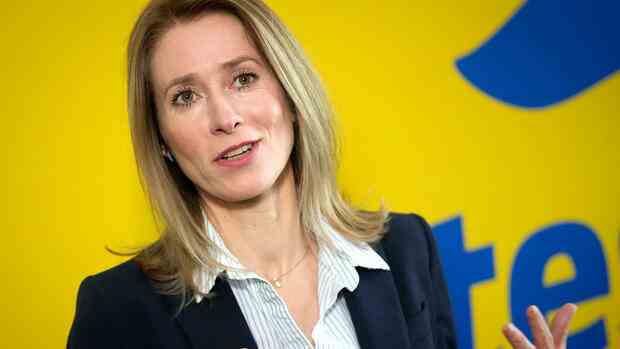Stockholm The Estonian Prime Minister Kaja Kallas has rarely been seen as relaxed as on Monday night. When it became clear shortly after midnight that her economically liberal Reform Party had won a clear election, the 45-year-old stepped in front of the microphones. “Our candidates have all done a great job,” she said, to the cheers of her party friends. This also applies to her: she achieved almost 32,000 votes in her constituency – none of her predecessors ever managed that.
The Reform Party won 37 of the 101 seats in the Estonian parliament, up from three seats in the last election. 31 percent of the voters gave the party their vote. Kalla’s party remains the largest parliamentary group and will most likely lead the next government. The right-wing populist party Ekre was the second strongest political force, losing two seats.
The liberal party Eesti 200 moved into the Riigikogu, the parliament in Tallinn, for the first time. The party won 14 seats directly and could become one of Kallas’ coalition partners. The previous coalition parties, the Social Democrats and the conservative party Isamaa, both suffered losses. Together with the Reform Party, however, it is mathematically possible to continue the previous coalition. “One thing is clear: the voters want the reform party to take the lead again in a new government,” Kallas emphasized on election night. She will explore all options in the coming days.
She has made a name for herself as a supporter of Ukraine
Ever since Russia invaded Ukraine, the lawyer has emerged as one of the strongest advocates for supporting Ukraine. In recent months, she has repeatedly called for faster and more extensive arms deliveries to the attacked country. She also resolutely advocates strengthening NATO’s eastern flank. And she is one of the loudest voices in favor of tougher sanctions against Russia.
She made international headlines last year with her call for an entry ban for Russian tourists. “Tourism is a privilege, not a human right, and that privilege does not belong to the citizens of a country that is waging a genocidal war against Ukraine,” Kallas said.
>> Also read here: Numerous states pledge support to Ukraine
Her distrust of her big neighbor, with which the EU and NATO country Estonia shares a border of around 300 kilometers, is understandable: she was shaped by the history of her country, which was annexed by the Soviet Union until 1990, but also of her own family. Her mother and grandmother were deported to Siberia by the Soviets in 1949, an event that still worries Kallas to this day. And so the geopolitical situation also played a major role in the election campaign.
The prime minister is not without controversy in Estonia.
(Photo: AP)
She has repeatedly called for more solidarity with Ukraine in recent weeks. Your small country with a population of just 1.3 million has submitted and taken in 60,000 refugees from Ukraine – more than any other country in terms of population. The country also occupies a leading position when it comes to military support for Ukraine: Estonia spends more than one percent of its gross domestic product on military aid.
During the election campaign, Kallas left no doubt that she would maintain this course of unconditional support for Ukraine. In doing so, she clearly distanced herself from the demands of the right-wing populist Ekre party, which wants to cut aid to Ukraine and has also stirred up sentiment against the Ukrainian refugees in Estonia. Voters rejected this position.
The election result may still be checked
The Ekre party leadership still does not want to acknowledge the defeat. The chairman, Martin Helme, said on the night of the election that it might be possible to apply to the court for a review of the votes cast digitally.
>> Also read here: Europe’s unity against Putin is fragile
Estonia was the first country in the world to allow online voting back in 2005. In total, more than half was submitted online. Observers in Tallinn do not expect any major changes in the election results, even after checking the votes cast online.
While Kallas enjoys great recognition abroad and was recently even considered a possible successor to NATO Secretary General Jens Stoltenberg, she is not without controversy in her own country. The high inflation of around 18 percent is causing problems for many citizens.
Getting price increases under control will be one of the most important tasks of your new government. Another tricky problem is how to deal with the Russian-speaking minority in Estonia, which makes up around a quarter of the total population. Many of them feel left out since the Russian attack on Ukraine.
Kallas will need a great deal of finesse to bridge the divide in Estonian society.
More: Estonia’s secret service warns the West
